
Plastic waste to be recycled into building materials for the first time in Armenia
Innovations in the contemporary world may make people’s daily lives more convenient, but they can also cause irreversible damage to nature.
Plastic bottles, disposable tableware and polyethylene bags are proof of this. According to the Ellen MacArthur Foundation, by 2050 the mass of waste in the sea is going to be far greater than the weight of the world’s entire seafood reserves. Plastic makes up 80% of the waste in the world’s oceans. As a result, the plastic waste that is thrown away returns in the form of polluted food, water and air.
Armenia may be a landlocked country without a coastline, but extensive use of plastic packaging has generated environmental issues here too. The country has not yet fully implemented a waste sorting policy, and the issue becomes more visible during strong winds, when polyethylene bags and plastic items pile up. According to a 2016 study supported by the Organisation for Security and Co-operation in Europe, plastic containers, bottles and bags are the main polluters of water in Armenia. Five thousand tonnes of polyethylene waste is collected in the country each year. Based on the average data for recent years, more than 622 tonnes of polyethylene bags are imported to Armenia and 201 tonnes produced in the country annually.
While the rest of the world invests in garbage sorting and recycling technologies, Armenian environmentalists and officials dealing with the issue of waste have for years believed that this is still a matter for the distant future for the country.
Armenia is not alone, as other countries in the region face difficult challenges in waste management. Working together for better environmental policies and greener investments is therefore a priority for EU cooperation with the country.
According to Andrea Baggioli, International Aid and Cooperation Officer at the EU Delegation to Armenia, although separation of waste is neither policy nor practice in Armenia, there are around 30 communities in the country where residents have been pioneering the separation and storage of plastic bottles for several years now. More and more communities throughout Armenia have shown a desire to start separating plastic. However, as the EU official highlights, this is where the chain breaks, as the plastic ends up in ever-expanding storage.
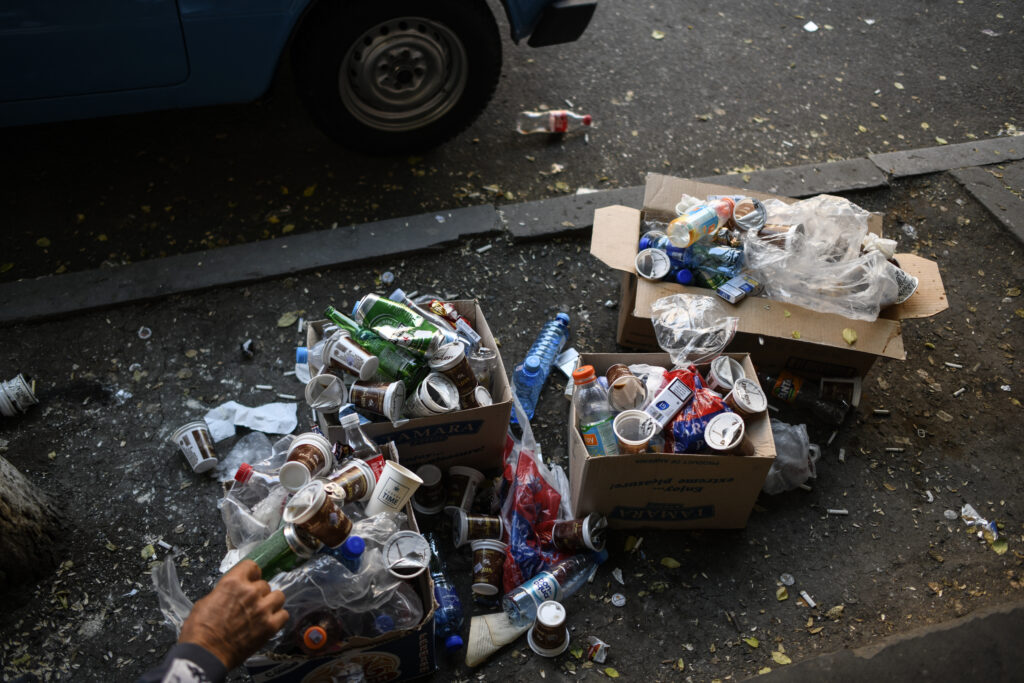 Trash and plastic wastes in one of the central streets of Yerevan (21 May, 2018. Credit: Nazik Armenakyan)
Trash and plastic wastes in one of the central streets of Yerevan (21 May, 2018. Credit: Nazik Armenakyan)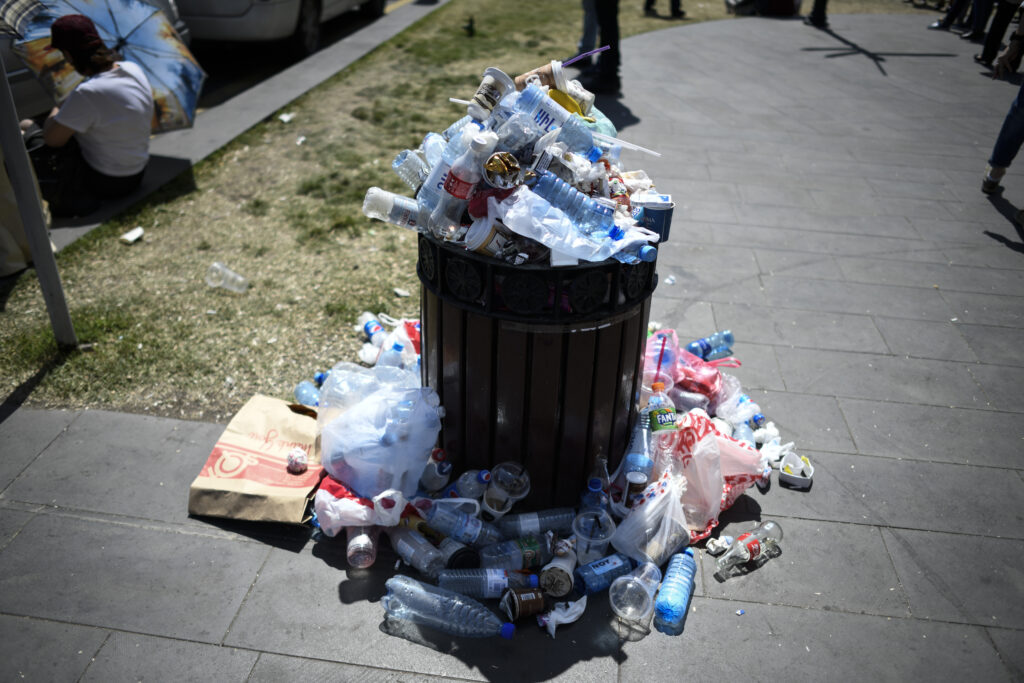 Plastic waste in the trash bin Republic square, Yerevan (21 May, 2018. Credit: Nazik Armenakyan)
Plastic waste in the trash bin Republic square, Yerevan (21 May, 2018. Credit: Nazik Armenakyan)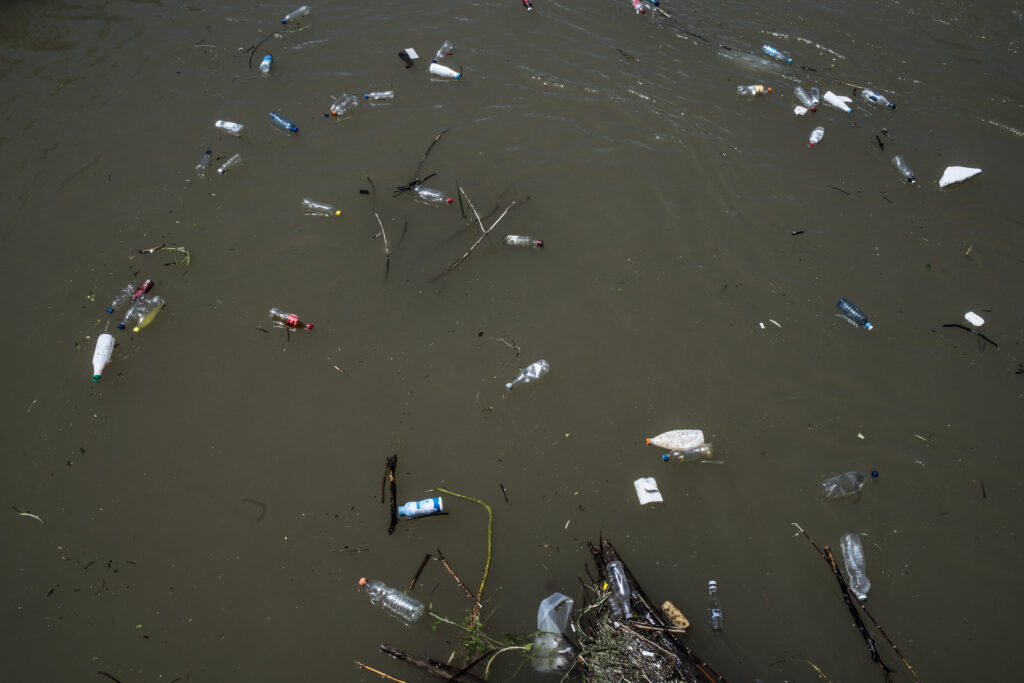 Plastic bottles in Voghji River, Kapan (May, 2018. Credit: Piruza Khalapyan)
Plastic bottles in Voghji River, Kapan (May, 2018. Credit: Piruza Khalapyan)
There is, however, one example which offers hope. In the town of Kapan, in Syunik Province in the southeast of the country, plastic waste will not only be sorted, but prepared for recycling and re-use in the construction sector. This will become possible thanks to the new ‘Turning environmental challenges into opportunities: Introducing building materials from plastic waste’ project, co-financed by the EU and the country’s government. According to its managers, we won’t have to wait long to see the results of the recycling.
“With this project, for the first time in Armenia, a startup recycling facility is going to be established in Kapan, Syunik Province, which will process plastic waste into materials after passing [through] several technological processes and mixing with sand on a production line. In order to supply the startup with enough plastic waste, the project will create infrastructure for its separation and collection all the way down from Yeghegnadzor to Meghri, involving nine communities of Vayots Dzor and Syunik. The first batch of curbstones and street tiles will be used to improve public spaces in those communities that have supplied plastic waste for the line,” Baggioli says.
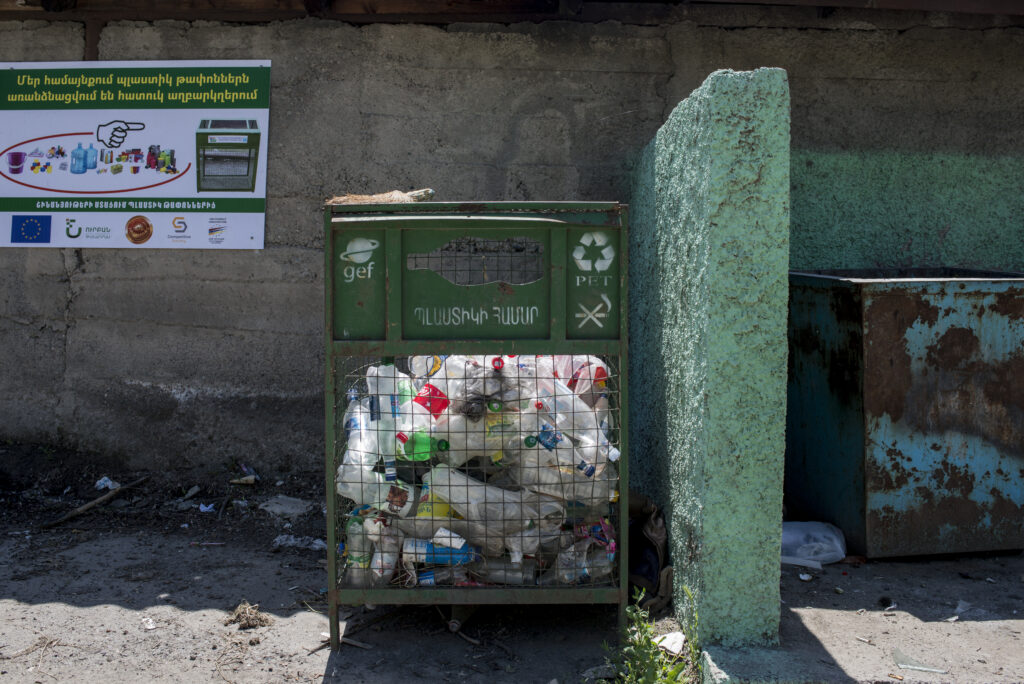 Trash bins for plastic bottles in the city of Kapan (May, 2018. Credit: Piruza Khalapyan)
Trash bins for plastic bottles in the city of Kapan (May, 2018. Credit: Piruza Khalapyan)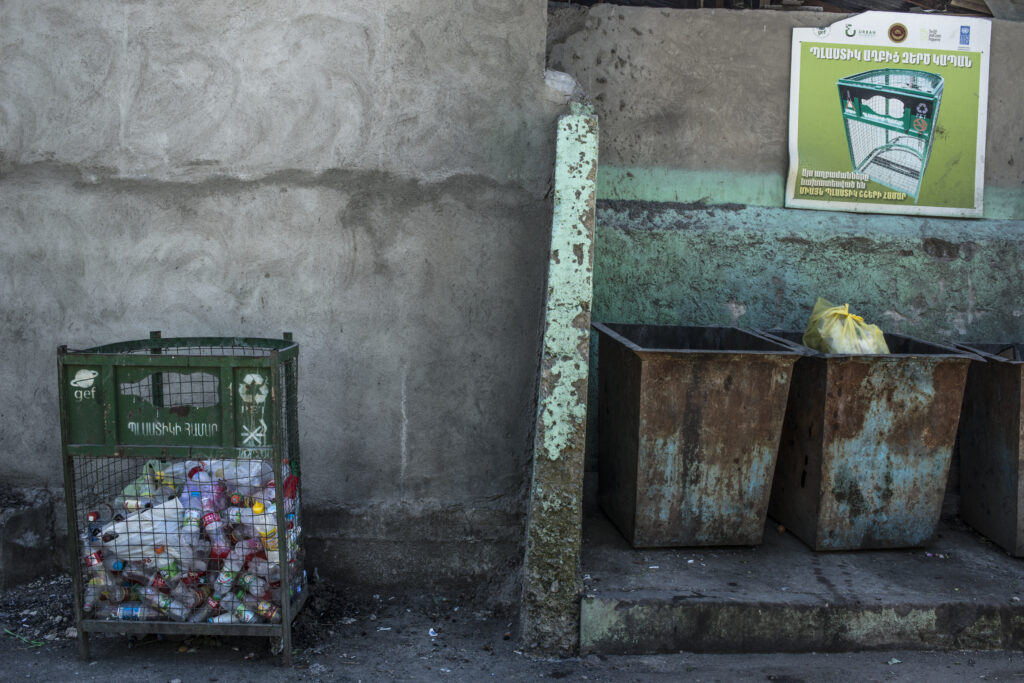 Trash bins for plastic bottles in the city of Kapan (May, 2018. Credit: Piruza Khalapyan)
Trash bins for plastic bottles in the city of Kapan (May, 2018. Credit: Piruza Khalapyan)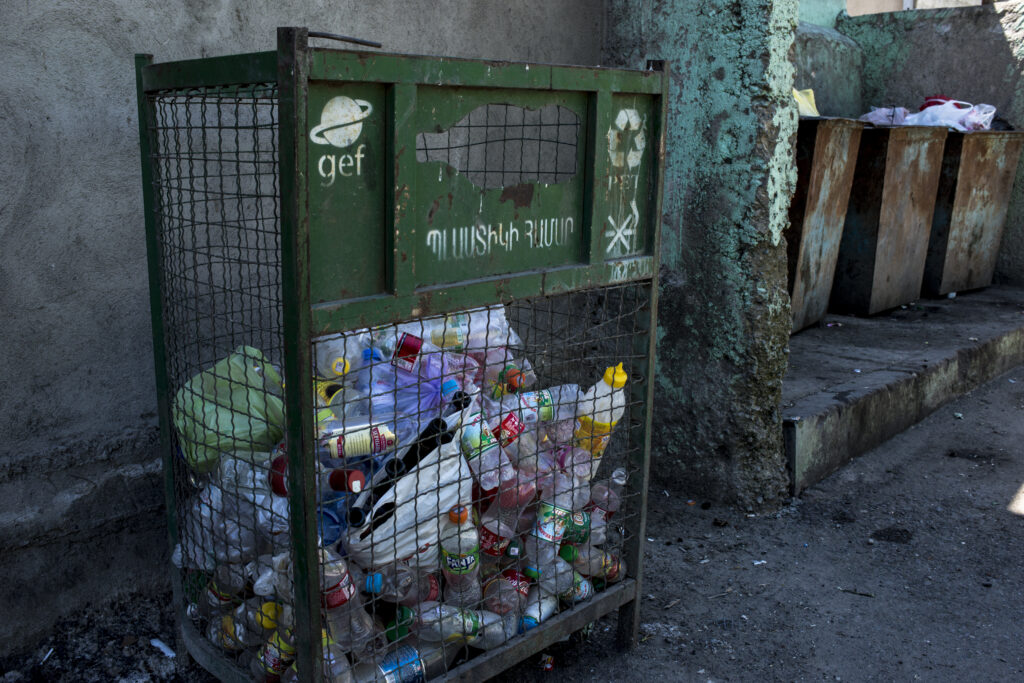 Trash bins for plastic bottles in the city of Kapan (May, 2018. Credit: Piruza Khalapyan)
Trash bins for plastic bottles in the city of Kapan (May, 2018. Credit: Piruza Khalapyan)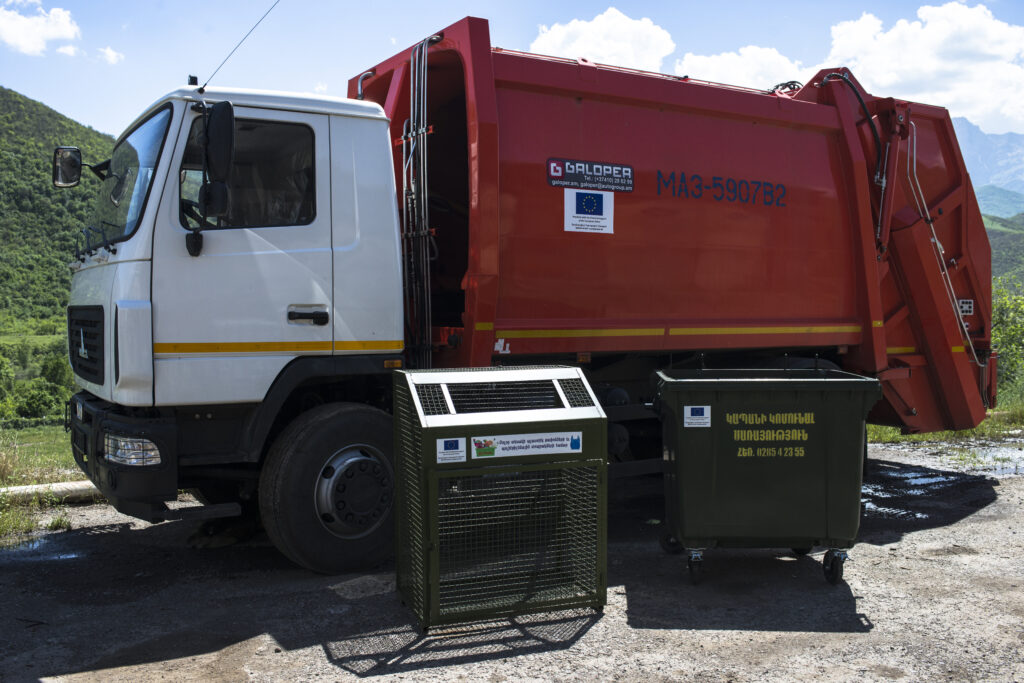 New trash bins and trash car for Kapan city, provided with the financial support from the EU (May, 2018. Credit: Piruza Khalapyan)
New trash bins and trash car for Kapan city, provided with the financial support from the EU (May, 2018. Credit: Piruza Khalapyan)
The two-year project’s budget is around €750,000, of which €510,000 has been provided by the European Union. The remaining 25% is funded by the Armenian government, the Urban Foundation for Sustainable Development (UFSD) and the municipality of Kapan. According to Armine Tukhikyan, UFSD Programme Director, the project aims to make management of household waste more productive, starting with plastic waste as a first step.
The project is being implemented under the Pilot Regional Development Programme Grant Scheme announced by the European Union and the Ministry for Territorial Administration and Development on 14 September 2015. According to the EU Delegation to Armenia, it fits into the overall environmental priorities of the EU-Armenia Comprehensive and Enhanced Partnership Agreement and helps promote a focus on circular economy (recycling), including through measures to develop a value chain, and specific educational and awareness activities.
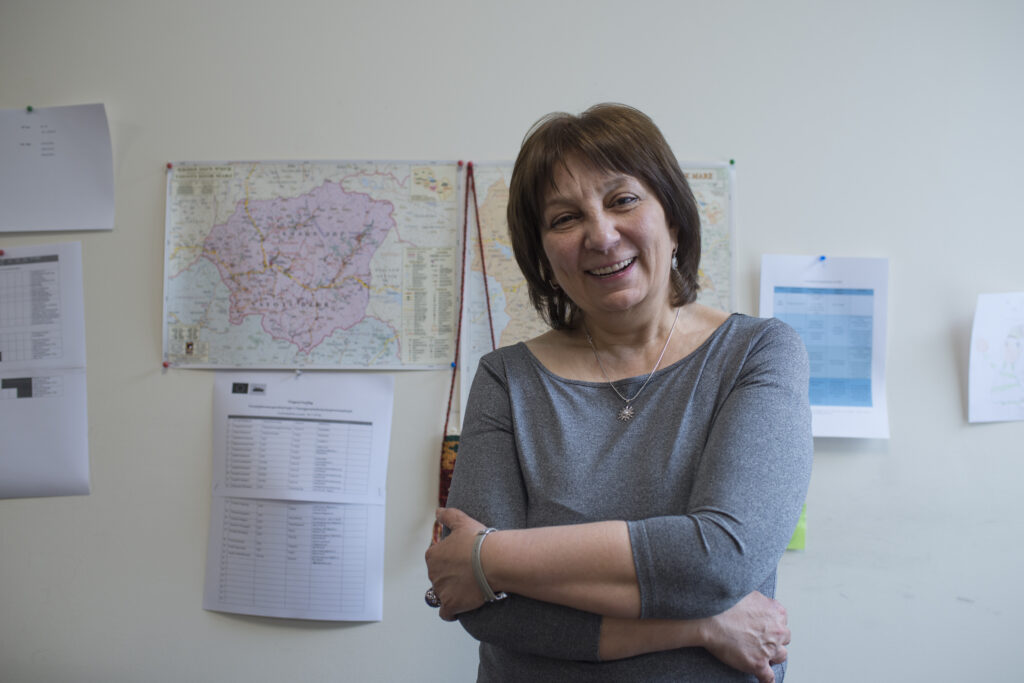 Armine Tukhikyan, Programme Director of Urban Foundation for Sustainable Development, Armenia (Credit: Piruza Khalapyan)
Armine Tukhikyan, Programme Director of Urban Foundation for Sustainable Development, Armenia (Credit: Piruza Khalapyan)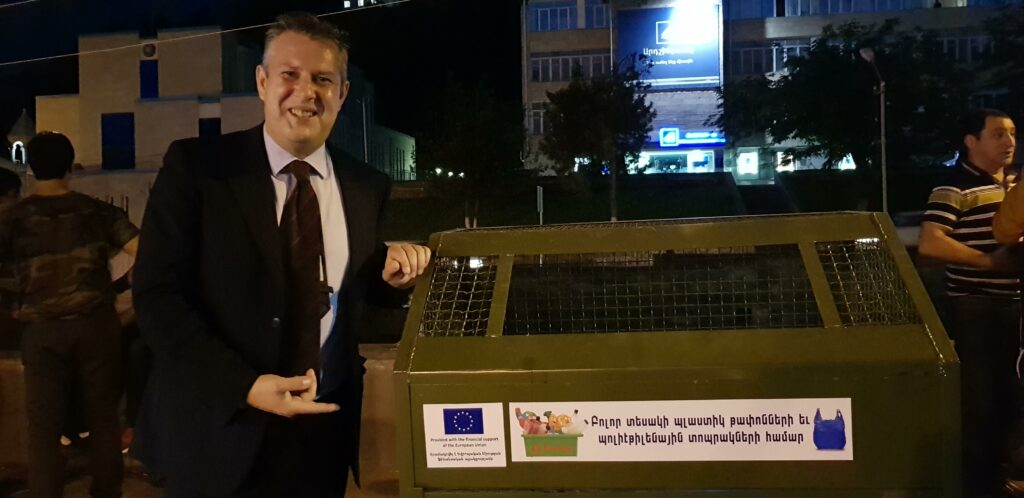 Andrea Baggioli, Programme Manager at the EU Delegation to Armenia during the “Turning Environmental Challenges into Opportunities – Introducing construction materials from plastic waste” project presentation (Kapan, Syunik, 26 May 2018).
Andrea Baggioli, Programme Manager at the EU Delegation to Armenia during the “Turning Environmental Challenges into Opportunities – Introducing construction materials from plastic waste” project presentation (Kapan, Syunik, 26 May 2018).
Baggioli says that more than 60 people will benefit from training and improve their chances in the country’s job market, with 35 getting permanent jobs. According to the EU official, the project has a strong environmental context, not only because it helps reduce plastic waste that ends up polluting nature, but because an environmental management system and operational safety and health system will be established through the startup that will pave the way for ISO certification. “The project has conducted market research for building materials containing plastic and will provide support in promoting the products with construction companies and vendors,” Baggioli says.
Tukhikyan says they have launched investment in a model for household plastic waste separation in around 30 communities in Armenia, and there are already many communities where plastic waste is sorted, collected, stored and pressed to shrink its volume. “With this project, for the first time in Armenia we’ll try to recycle waste stored in the plant and obtain building materials.”
The new start-up facility will use 80% sand and 20% plastic waste. Melting the plastic will provide extra viscosity for the sand, which is generally provided by cement. “For the time being, we plan to obtain six types of building materials, but it’s a method that’s been adopted to obtain hundreds of materials worldwide,” Tukhikyan adds. “Works on the installation of the plant will be over in two months, after which the supplier is urged to launch training for new employees to be recruited to the plant. They’ll start to produce building material and [then] we’ll have a product in September-October.” According to Tukhikyan, due to its technical characteristics, the plastic product will surpass the quality of equivalent products made by sand and cement.
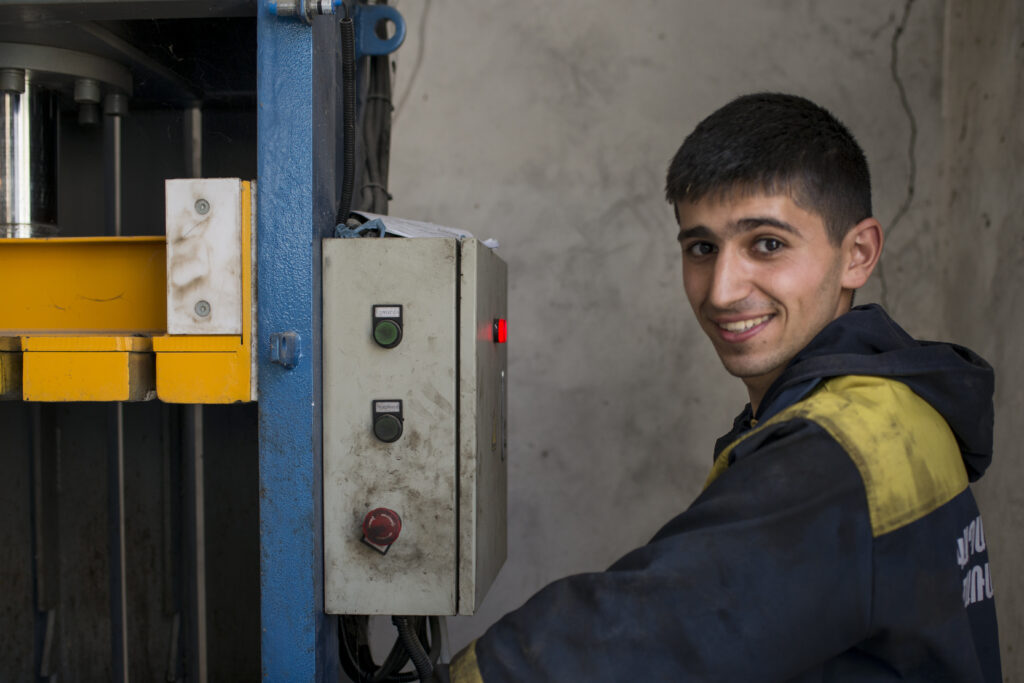 Artashes Tevanyan, the specialist of pressing the plastic waste at the communal service of Kapan city (May, 2018)
Artashes Tevanyan, the specialist of pressing the plastic waste at the communal service of Kapan city (May, 2018)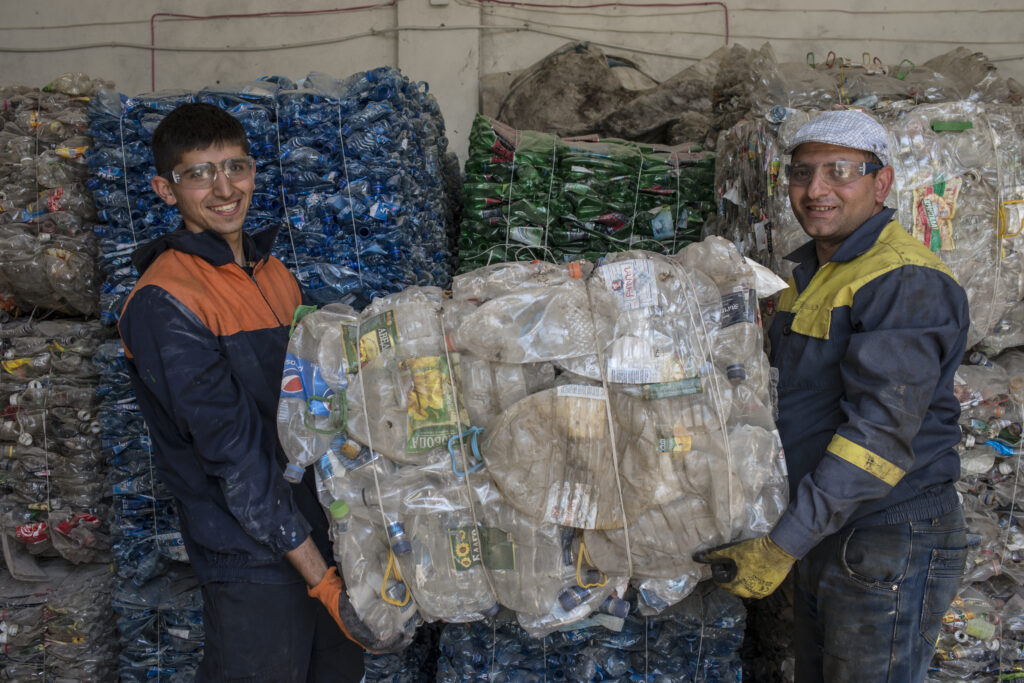 Artashes Tevanyan and Kamo Grigoryan are workers of communal service of Kapan city (May, 2018. Credit: Piruza Khalapyan)
Artashes Tevanyan and Kamo Grigoryan are workers of communal service of Kapan city (May, 2018. Credit: Piruza Khalapyan)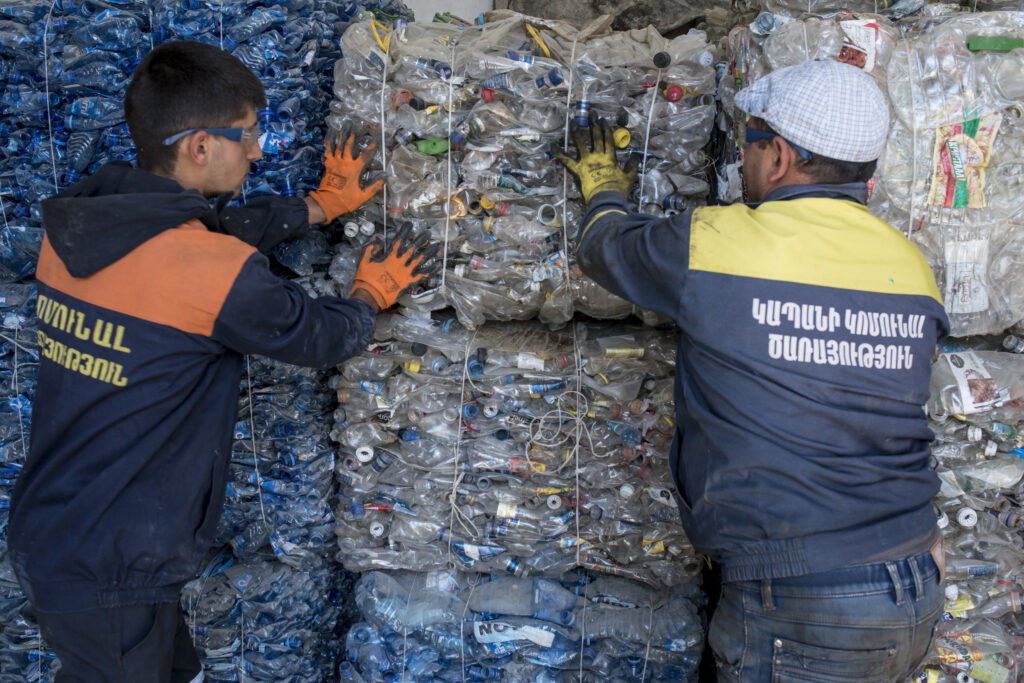 Artashes Tevanyan and Kamo Grigoryan are workers of communal service of Kapan city. (Credit: Piruza Khalapyan)
Artashes Tevanyan and Kamo Grigoryan are workers of communal service of Kapan city. (Credit: Piruza Khalapyan)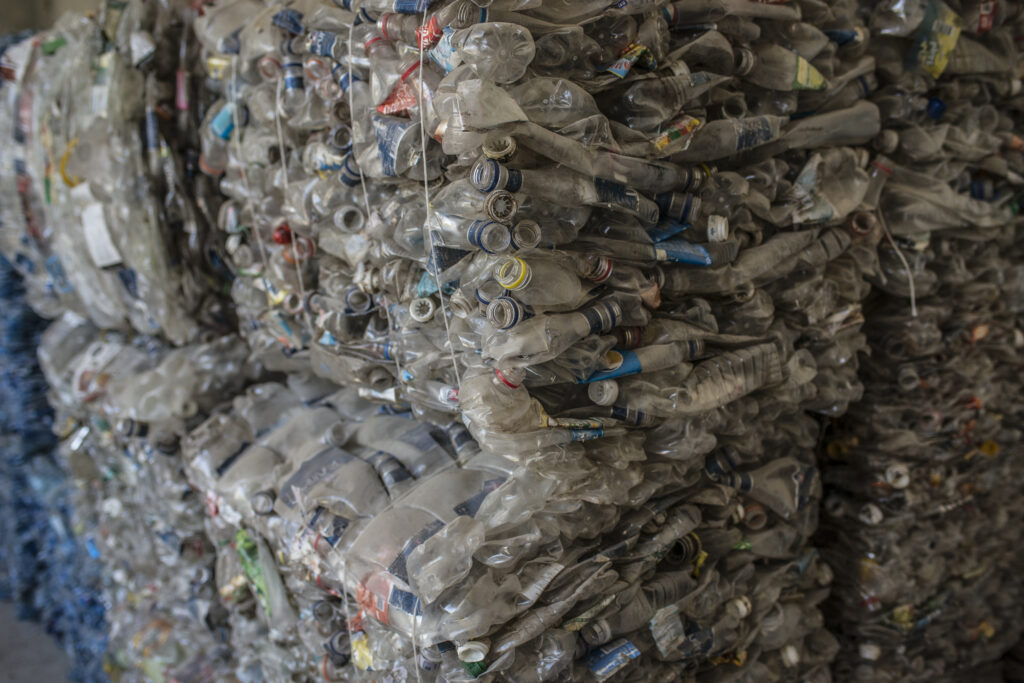 Pressed plastic waste (May, 2018. Credit: Piruza Khalapyan)
Pressed plastic waste (May, 2018. Credit: Piruza Khalapyan)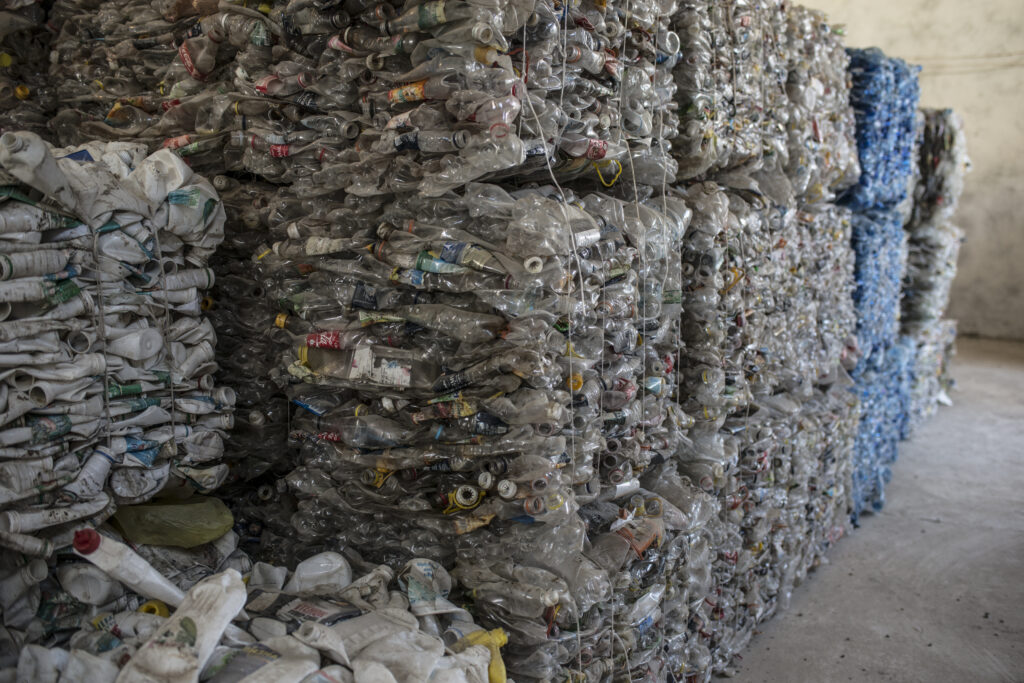 Pressed plastic waste. (Credit: Piruza Khalapyan)
Pressed plastic waste. (Credit: Piruza Khalapyan)
Tukhikyan says they have developed a three-step model for investment in technology for the separation of solid household waste from plastic waste. According to her, the first stage will be in close cooperation with local self-governing bodies.
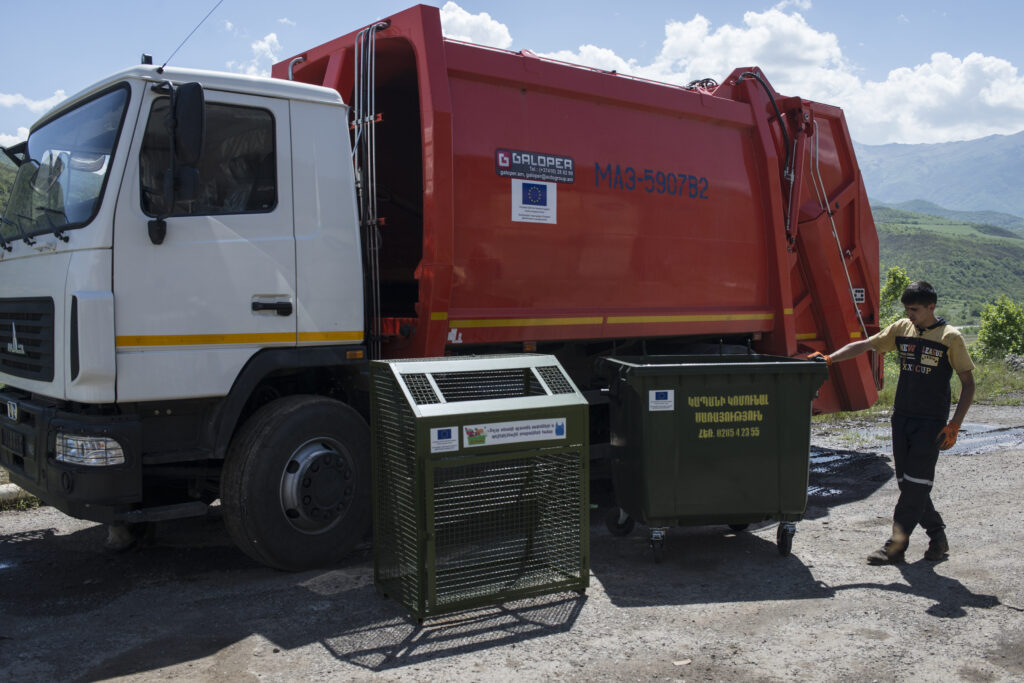 New trash bins and trash car for Kapan city, provided with the financial support of the European Union. (Credit: Piruza Khalapyan)
New trash bins and trash car for Kapan city, provided with the financial support of the European Union. (Credit: Piruza Khalapyan)
The next stage, according to Tukhikyan, will be the creation of infrastructure in the town and the other regions where the project is implemented. “That is to say, we create appropriate conditions for inhabitants to sort. For example, we install special bins for plastic next to common garbage bins, after which, through the third stage – wide public awareness campaigns – we inform people why this is necessary, where the threat is when plastic appears in landfill, and how to deal with plastic in everyday life,” she explains. According to Tukhikyan, a combination of public awareness, infrastructure and local self-government can ensure the community is able to collect, store and either manage or sell its plastic waste.
Those behind the project insist that production from recycled plastic waste will be a reality soon enough. Perhaps the project will even become a model and set a precedent in the field of waste sorting and recycling in Armenia.
Author: Araks Martirosyan
Article published in Armenian, Russian and English by 168.am
MOST READ
SEE ALSO

No, time is not on Russia‘s side
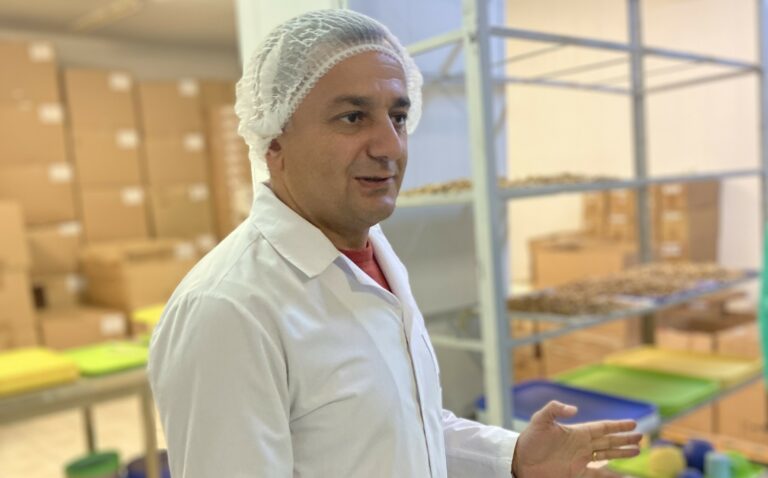
Sweet smell of chocolate
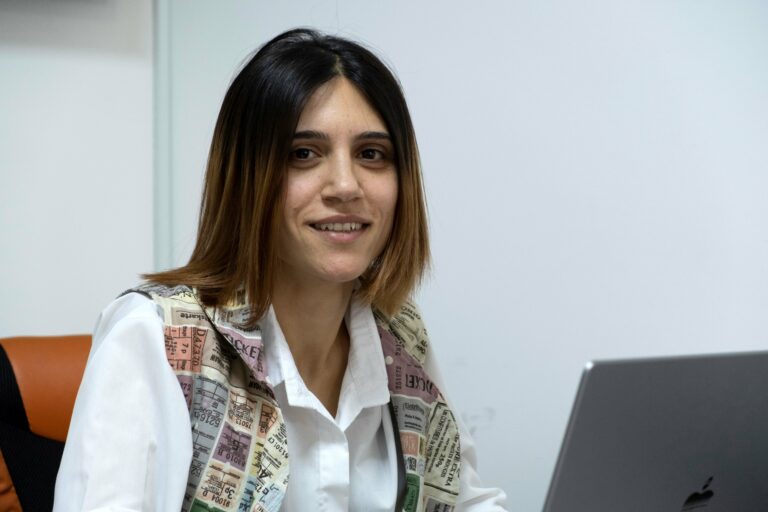
‘Be yourself, and always move forward’: Meri’s advice to young women in business

Be one step ahead of a hacker: check simple cybersecurity tips!
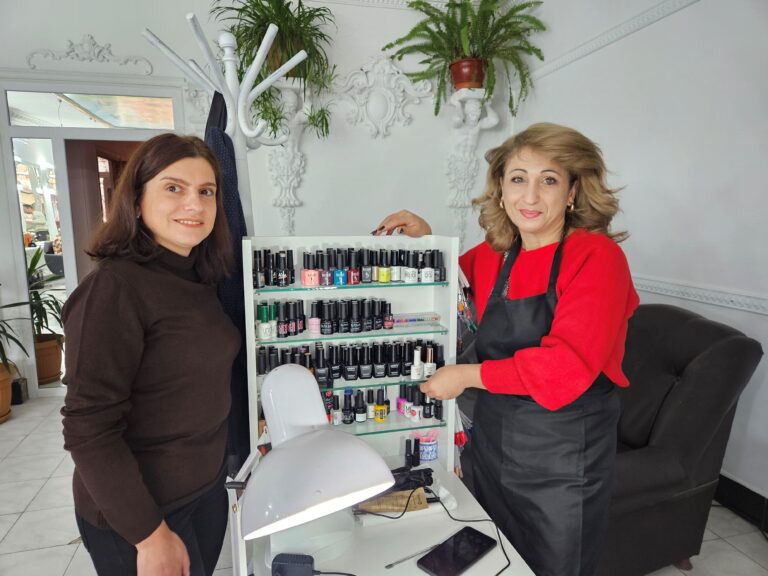
The power of skills: women paving the way to their own business in rural Armenia
More campaign pages:
Interested in the latest news and opportunities?
This website is managed by the EU-funded Regional Communication Programme for the Eastern Neighbourhood ('EU NEIGHBOURS east’), which complements and supports the communication of the Delegations of the European Union in the Eastern partner countries, and works under the guidance of the European Commission’s Directorate-General for Neighbourhood Policy and Enlargement Negotiations, and the European External Action Service. EU NEIGHBOURS east is implemented by a GOPA PACE-led consortium. It is part of the larger Neighbourhood Communication Programme (2020-2024) for the EU's Eastern and Southern Neighbourhood, which also includes 'EU NEIGHBOURS south’ project that runs the EU Neighbours portal.

The information on this site is subject to a Disclaimer and Protection of personal data. © European Union,







